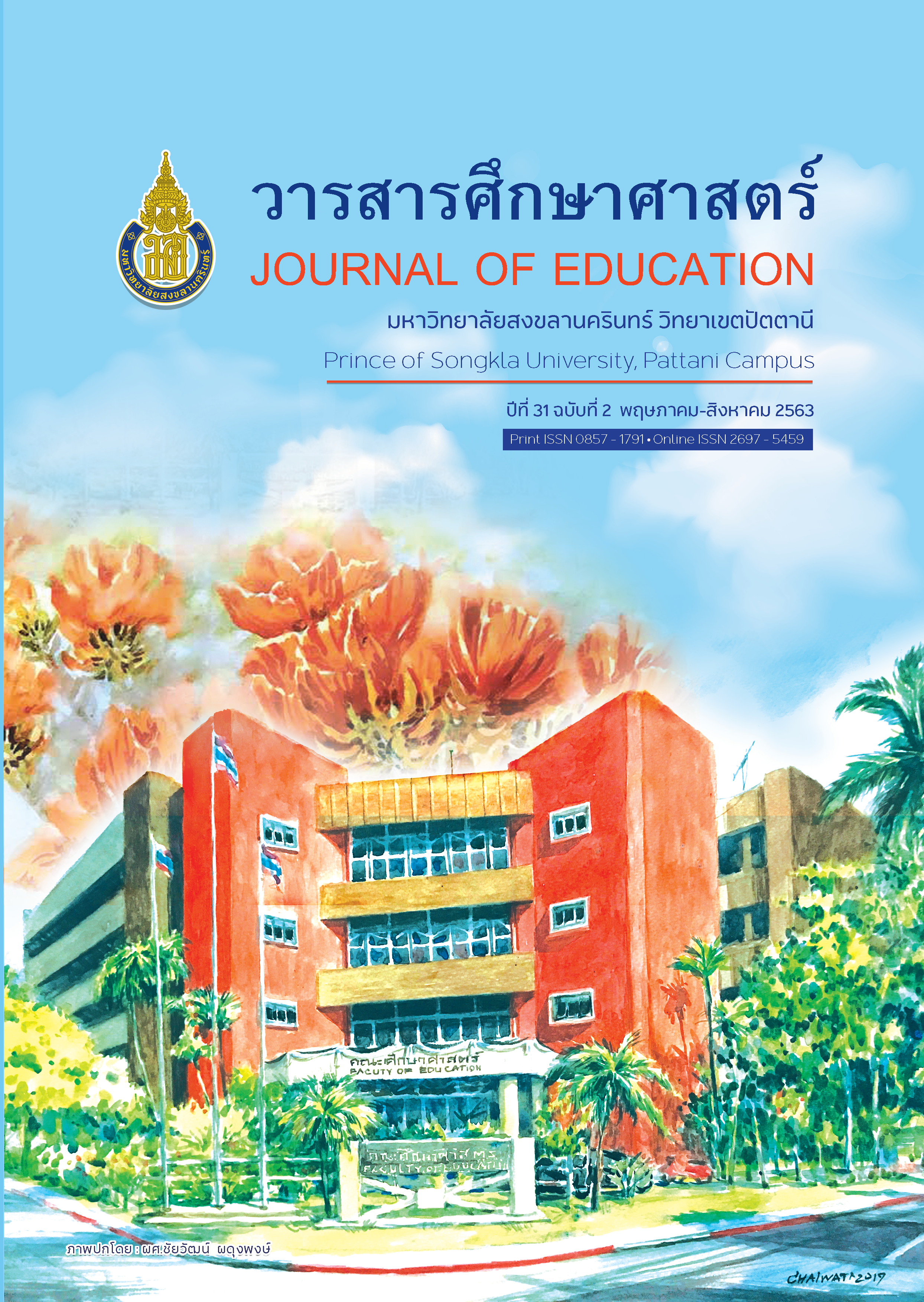การตรวจสอบการใช้แบบจำลองโต้ตอบเสมือนจริง สำหรับการสอนไฟฟ้ากระแสตรง
Main Article Content
บทคัดย่อ
โครงการ Physics Education Technology (PhET) ประกอบด้วย แบบจำลองโต้ตอบเสมือนจริงมากกว่า 50 แบบจำลองซึ่งอยู่บน https://phet.colorado.edu แบบจำลองโต้ตอบเสมือนจริงประกอบไปด้วยแบบจำลองในวิชา ฟิสิกส์ ชีววิทยา เคมี วิทยาศาสตร์โลก และคณิตศาสตร์ บทความวิจัยนี้มุ่งเน้นสำรวจความเข้าใจที่มีต่อกิจกรรมการสอนวงจรไฟฟ้ากระแสตรงด้วยการใช้แบบจำลองโต้ตอบเสมือนจริง แบบจำลองโต้ตอบเสมือนจริงเรื่องการสร้างวงจรไฟฟ้าให้รายละเอียดเกี่ยวกับวงจรไฟฟ้า และอุปกรณ์ในวงจรไฟฟ้าเช่น สวิตซ์ แบตเตอรี่ ตัวต้านทานไฟฟ้า สายไฟ หลอดไฟ แอมมิเตอร์ และโวลต์มิเตอร์ ผลจากการศึกษานี้แสดงให้เห็นว่า นักศึกษาที่เรียนโดยใช้แบบจำลองโต้ตอบเสมือนจริงเรื่องการสร้างวงจรไฟฟ้าให้ผลตอบรับในเชิงบวกกับการสร้างวงจรไฟฟ้ากระแสตรง โดยวิเคราะห์จากการตอบแบบประเมินความพึงพอใจสำหรับแบบจำลองโต้ตอบเสมือนจริง ซึ่งเป็นสิ่งที่ส่งผลอย่างชัดเจนว่าการใช้แบบจำลองโต้ตอบเสมือนจริงสามารถส่งเสริมการเรียนรู้ของนักศึกษาในเรื่องการสร้างวงจรไฟฟ้า นักศึกษาส่วนใหญ่เห็นด้วยกับการใช้แบบจำลองโต้ตอบเสมือนจริงในการเรียนการสอน โดยระบุว่า ช่วยให้นักศึกษาสามารถสร้างมโนมติทางฟิสิกส์ ตลอดจนสามารถมองเห็นภาพได้ชัดเจนและสามารถนำไปประยุกต์ใช้ในชีวิตประจำวันได้
Article Details
เอกสารอ้างอิง
Azar, A., & Sengulecgok Ö. A. (2011). Computer-Assisted and Laboratory–Assisted Teaching Methods in Physics Teaching: The effect on Student Physics Achievement and Attitude towards Physics. Eurasian Journal of Physics and Chemistry Education. 1 (Special Issue), 43-50.
Baltzis, K.B. & Koukias K.D. (2009). Using Laboratory Experiments and Circuit Simulation IT Tools in an Undergraduate Course in Analog Electronics. Journal of Science Education and Technology. 18(6), 546-555.
Clark, T.M. & Chamberlain J.M. (2014). Use of a PhET Interactive Simulation in General Chemistry Laboratory: Models of the Hydrogen Atom. Journal of Chemical Education. 91(8), 1198-1202.
Gok, T. (2011). The effect of the computer simulations on students’ learning in physics education. International Journal on New Trends in Education and Their Implications. 2(2), 104-115.
Hsiao, H.S., Chen, J.C., Hong, J.C., Chen, P.H., Lu, C.C, Chen S.Y. (2017). A five-stage Prediction-observation-explanation inquiry-based Learning Model to improve Students’ Learning Performance in Science Courses. Eurasia Journal of Mathematics Science and Technology Education. 13(7), 3393-3416.
Mckagan, S.B., Perkins K.K., Dubson M., Malley C., Reid S., LeMaster R., Wieman, C.E. (2008). Developing and researching PhET simulations for teaching quantum mechanics. American Journal of Physics. 76(4), 406-417.
Perkins, K.K., Adams, W., Dubson M., Finkelstein N., Reid S., Wieman C.E., LeMaster R. (2006). PhET: Interactive Simulations for Teaching and Learning Physics. The Physics Teacher. 44(1), 18-23.
Wieman, C.E, Adams, W., S.B., Perkins, K.K. (2008). PhET: Simulations That Enhance Learning. Science. 322(5902), 682-683.
Wieman, C.E. & Perkins, K.K. (2006). A powerful tool for teaching science. Nature Physics 2(5), 290-292.


